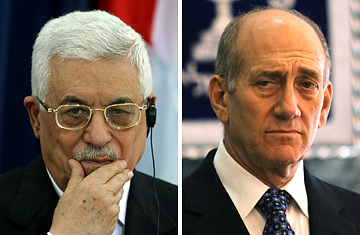
Left; Palestinian President Mahmud Abbas and Israeli Prime Minister Ehud Olmert
(2 of 2)
Pragmatic and persevering leaders may yet overcome the supposedly intractable issues at the core of the Israeli-Palestinian dispute. Arafat's successor Palestinian President Mahmoud Abbas and key Israeli political figures, including Prime Minister Ehud Olmert, have in one way or another signaled their willingness to accept Jerusalem as two capitals for two states. There is an increasing consensus about Israel's need to withdraw to the pre-1967 borders, albeit with land swaps that accommodate the reality of large Jewish population centers in the West Bank planted during decades of settlement projects.
Even the issue of Palestinian refugees is not the deal killer that many politicians and pundits suggest. Negotiators have tackled this topic before and a practical understanding is on the table. Israel will agree to allow a symbolic number of perhaps several thousand Palestinians to return to their homes in what is now Israel, addressing an injustice that has fueled the Palestinian struggle. Palestinians, for their part, will agree that for the sake of Israel's desire to maintain its Jewish character the bulk of refugees will be incorporated into the Palestinian state, or given citizenship in their current countries of residence or in third countries under an international humanitarian program. In the informal Geneva Initiative of 2003, Palestinian negotiators close to Arafat agreed that the limited return of refugees would be "at the sovereign discretion of Israel."
If the sides can agree on that much, what's holding them back? The answer is the rough-and-tumble of Israeli and Palestinian domestic politics, on one hand, and, on the other, a past tendency toward unsuccessful brinksmanship in negotiations. It's also a failure on the part of the international community, in particular of the U.S., to uphold a vision of peace and pressure the parties, Israelis as well as Arabs, to work out the necessary details. The Clinton administration waited until its final six months in office to tackle the main issues of the Israeli-Palestinian dispute. The Bush administration ignored mediation altogether for its first six years in office.
For the last year, however, Secretary of State Condoleezza Rice has taken the opposite approach. She has now, quietly and painstakingly, re-launched comprehensive peace negotiations based on past agreements and plans that enjoy a wide consensus. Rice is making it clear that in the post-9/11 world of terrorist threats, the U.S. can no longer be complacent about the lack of an Israeli-Arab peace settlement. In a Nov. 4 speech to an Israeli audience in Jerusalem, she pointedly warned about Israel's continuing occupation, saying "the prolonged experience of deprivation and humiliation can radicalize even normal people." She also warned that time is running out. "My fear," she said, "is that if Palestinian reformers cannot deliver on the hope of an independent state, then the moderate center could collapse forever and the next generation of Palestinians could become lost souls of unbridled extremism."
That shared fear is the reason that all the parties will take up their seats in Annapolis, and why it won't be a mere photo op. But to avoid becoming the peace conference to end all peace, Rice must sustain this new approach to addressing conflict in the Middle East.
